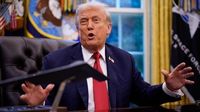On Monday, October 6, 2025, President Donald Trump made a splashy return to TikTok, posting his first video on the platform since the 2024 election and instantly setting off a wave of commentary and speculation. In the video, filmed from the Oval Office, Trump declared, "To all of those young people of TikTok, I saved TikTok, so you owe me big," adding with characteristic bravado, "And now, you’re looking at me in the Oval Office, and someday one of you is going to be sitting right at this desk, and you’re going to be doing a great job also." According to Fortune, this message was not just a social media stunt—it was a victory lap after months of tense negotiations and shifting political winds regarding the future of the wildly popular app in the United States.
Trump’s TikTok post was more than just a meme-worthy moment. It marked the culmination of a multiyear saga that saw the platform’s fate tossed between executive orders, bipartisan legislation, and international diplomacy. Back in 2020, Trump himself was the first to threaten a TikTok ban, citing national security and data privacy concerns tied to its China-based parent company, ByteDance. Fast forward to 2024, and President Joe Biden signed into law a bipartisan mandate requiring TikTok to divest its U.S. operations or face a ban—an unprecedented move in the ongoing U.S.-China technology rivalry, as reported by Newsweek.
But in a sharp reversal of his earlier stance, Trump recently signed an executive order giving TikTok a new lease on life—provided it came under majority American ownership. The deal, valued at around $14 billion (a figure analysts say is below what the U.S. operations might fetch in an open auction), allows a consortium of American investors to take the reins. This group includes some of the country’s most prominent billionaires: Larry Ellison, Rupert Murdoch, and Michael Dell, as well as investment powerhouses like Oracle and Silver Lake Partners.
What’s behind this dramatic pivot? For one, TikTok’s reach is staggering. With an estimated 170 million American users—many of them under 30—the app has become a central hub for news, entertainment, and political discourse. As Fortune notes, it’s also become a vital tool for political campaigns, especially as younger voters have shown increasing turnout and engagement, even swinging more towards the Republican ticket in the 2024 presidential election. Trump’s campaign insiders have acknowledged that embracing TikTok is a strategic move, signaling a new approach to reaching a generation that has traditionally leaned Democratic.
The new ownership structure is designed to address the core concerns that drove the original push for a ban. Under the terms of the deal, Oracle will have a copy of TikTok’s algorithm and will oversee the platform’s security operations. ByteDance, while remaining a stakeholder, will be limited to less than 20% ownership and will have no role in security-related activities. The U.S. portion of TikTok will now control the influential recommendation algorithm using only domestic data, a move intended to reassure Americans that their data is protected from foreign manipulation.
Negotiations leading up to the deal were anything but straightforward. According to Newsweek, senior U.S. officials—including Treasury Secretary Scott Bessent and U.S. Trade Representative Jamieson Greer—held several rounds of talks with their Chinese counterparts, with some meetings taking place in Spain. Ultimately, both U.S. and Chinese officials, including Chinese President Xi Jinping, signaled their alignment on the new ownership arrangement. ByteDance publicly expressed gratitude, stating, "We thank President Xi Jinping and President Donald J. Trump for their efforts to preserve TikTok in the United States. ByteDance will work in accordance with applicable laws to ensure TikTok remains available to American users through TikTok U.S."
Vice President J.D. Vance also jumped back into the TikTok fray on Monday, relaunching his own page and promising a mix of political updates and lighthearted "sombrero memes." In his video, Vance admitted, "I got a little lazy the last few months was focused on the job of being VP and not on TikTok," but pledged to be more active going forward. His return—alongside Trump’s—signals a broader Republican embrace of the platform, a far cry from the days when banning TikTok was a bipartisan rallying cry.
White House press secretary Karoline Leavitt praised Trump’s foresight on Fox News in September, saying, "President Trump was ahead of the curve on this he recognized the need to protect Americans privacy and data while also keeping this app open." The administration’s messaging has focused on balancing national security with the interests of millions of young Americans who rely on TikTok for connection and self-expression.
The specifics of the deal are still being finalized, with further discussions between Trump and Xi expected in the coming weeks. Vice President Vance has indicated that more details will be released as the new structure takes shape. In the meantime, market regulators and civil rights advocates are watching closely to see how the changes will impact TikTok’s data privacy policies, content moderation, and overall user experience.
The implications of this saga stretch far beyond TikTok. As Newsweek points out, the case could set important precedents for how the U.S. scrutinizes and regulates other foreign-owned tech services, especially as concerns about digital rights, data governance, and national security continue to mount. For now, though, millions of American TikTok users can breathe a sigh of relief—and perhaps, as Trump suggests, even feel a bit grateful.
As the dust settles on this latest chapter of U.S.-China tech rivalry, one thing is clear: TikTok’s future in America is secure, at least for now, and its role in shaping political and cultural conversations remains as powerful as ever.

